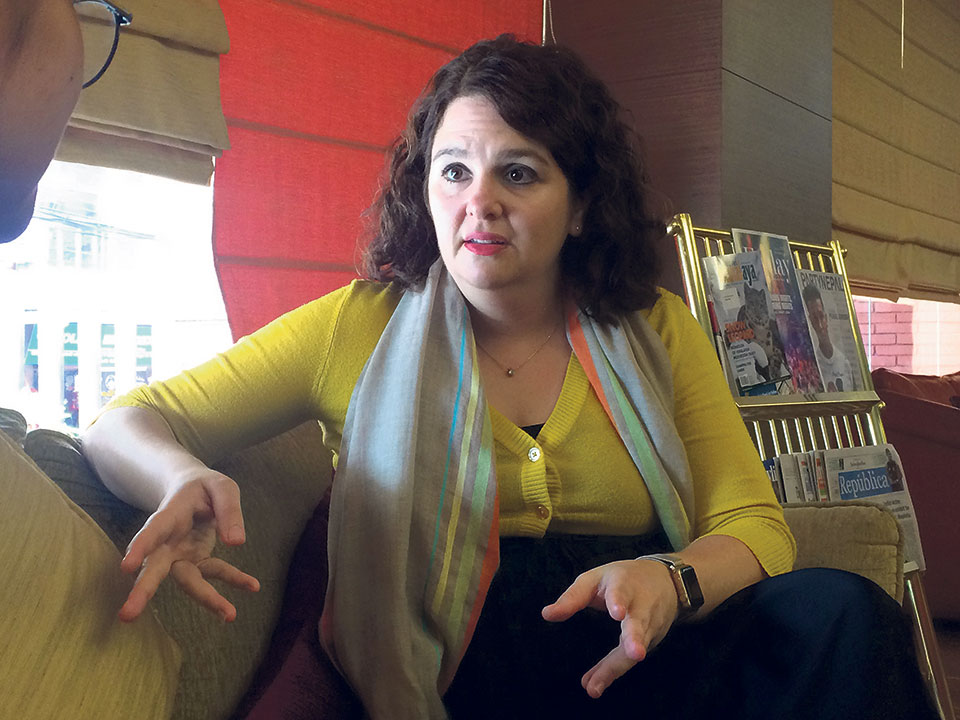Cham: The Dance Meditation (With Video)
5 years ago

5 years ago

5 years ago

5 years ago

5 years ago

5 years ago

Julie Westfall began her career by writing for a student publication during her high school days. Nonetheless, she had a keen affection for writing since her childhood. Westfall remembers getting attracted toward her current procession in the process of drafting stories for the publication she worked for. After a long internship experience, where she was required to cover diverse issues, she was finally appointed the deputy politics editor at the Los Angeles Times. Her stories traversed across the country while she also served as a Peace Corps volunteer in Mali.
On her recent visit to Nepal, as US Embassy’s Media Speaker, Julie Westfall shared valuable insights of her experience as women journalist to My City’s Sonam Lama.
How was your first experience of interacting with Nepali journalists?
The experience was wonderful. I got to speak to a lot of different groups of women, people from the minority community, and newly elected ward representatives. I got to interact with district reporters on getting stories told, framing stories, and learning the process of reporting. A lot of women in the group didn’t have a long experience, so it was good to talk to them about how reporters can find their stories. I spoke to many groups of women journalists in Pokhara and Kathmandu and I was impressed and inspired by the women who have been fighting to become a journalist in Nepal. Some of them are just starting, while some have 20 years of experience and are running women-only radio stations. I was really inspired by their ideas and thoughts on what needs to change.
In your view, what are the prevailing challenges that journalists have to face?
Yes, journalism is a very tough and challenging job. The challenging part of every journalist is figuring out a future for sustainable journalism, no matter where they are. Since the business model of newspapers has changed, there is a need to figure out a new business model, and a new way to sustain careers.
What do you think are the principles that journalists should abide by while reporting a story?
I think all journalists should follow pretty similar codes of conduct regardless of what medium they work on. I would say that fairness is an important factor. In some ways, it is even more important than objectivity and biases. Fairness encompasses a lot of things, including diversity in your reporting ensuring that you don’t talk to the same people over and over again. So, if you are being fair, you are including not only everyone’s viewpoint but diverse perspectives as well.
How do you picture the rising influence of digital media affecting print media in the future?
I think print products, especially big newspapers, will continue to exist for some time. Print products were the only available source, in the past. It published the news and selling advertisements. However, now, it is one of the mediums for companies to make money. For some companies, it is still the biggest revenue generator but they have their website and podcasts. So, there are many ways to distribute news now. I think print will still be a product in the future. It may disappear for some companies; they might shift entirely onto digital platforms. Also, print products will be a premium product suited for persistent stories and visual journalism.
Have you come across any threat while covering political issues?
I have been mostly working as an editor and I am not at the front line. But I have come across reporters, mostly women, who frequently get threats via email or social media. They are mostly women because the journalists in the US are exposed, especially those writing about politics or high profile issues or other divisive issues. Journalists in the US are under threat quite a lot now because the press is often under attack. There are good things with journalists being exposed as it provides better ways to interact with the audience and develop readership. But sometimes, people take it as an advantage to threaten journalists.
In your opinion, how safe do women in the US feel in the workplace?
I don’t want to speak for all women journalist in the US but I think women in the workplace deal with discriminations which are not direct at times. Their voices are not heard quite often and their ideas are not taken seriously until a man voices them. I have come across women who have been sexually harassed in the workplace so that is still an issue for women of my generation. It also has been an issue that has prominently been discussed in the wake of ‘Me Too Movement’ and something that many people are aware of now.
Do you have any words of advice for youths looking forward to pursuing a career in journalism?
Perhaps one of the things that people should think about is making newsroom in Nepal more diverse. To increase diversity, people can start by investing in the education of women and journalists from minority groups so that they can start training and admitting more people, and get them the training that they think is necessary for them to become strong journalists. The other advice would be to make sure that you engage diverse people whenever you can while covering any issues.
Leave A Comment